Job 10 meaning explained in AI Summary
In Job chapter 10, Job continues his lament, but this time, his focus shifts from questioning God's justice to pleading for understanding and mercy.
1. Job's Anguish and Frustration (10:1-7):
- Job expresses his weariness with life and his frustration with God's seemingly relentless attacks.
- He feels trapped and powerless, like a prisoner under God's scrutiny.
- He questions why God, his creator, has turned against him, treating him like an enemy.
2. Job Acknowledges God's Power and Sovereignty (10:8-13):
- Despite his complaints, Job acknowledges God's creative power and his own mortality.
- He recognizes that God formed him in his mother's womb and has sustained him throughout his life.
- He acknowledges that God could easily destroy him, yet still pleads for mercy.
3. Job's Plea for Compassion and Relief (10:14-22):
- Job begs God to look upon him with compassion and cease his punishment.
- He feels overwhelmed by suffering and longs for a moment of respite.
- He expresses a deep longing for death, seeing it as the only escape from his pain.
Key Themes:
- The Problem of Suffering: Job grapples with the question of why a righteous person like himself must endure such immense suffering.
- God's Sovereignty: Despite his pain, Job recognizes God's ultimate power and control over his life and death.
- The Cry for Mercy: Even in his anger and despair, Job still holds onto a sliver of hope, pleading for God's mercy and understanding.
Overall, Chapter 10 portrays the raw, emotional struggle of a man wrestling with unimaginable suffering. It highlights the tension between human experience and divine justice, leaving the reader to ponder the complexities of faith and suffering.
Job 10 bible study ai commentary
Job 10 is Job's formal legal complaint directly to God, a raw and desperate monologue of anguish. He pivots from debating his friends to confronting his Creator, using the language of a courtroom (rîḇ, or lawsuit). The chapter masterfully contrasts the intimate, beautiful act of God's creation of Job with the present reality of His seemingly relentless, destructive pursuit. Job questions God's very nature and motives, accusing Him of creating him only for the purpose of torment, and ends with a heartbreaking plea for a brief respite before the finality of death.
Job 10 context
This chapter operates within an ancient Near Eastern legal and cultural framework. Job's speech mimics a rîḇ, a covenant lawsuit, where an individual brings a case against a higher power—in this instance, daringly against God Himself. He acts as his own defense attorney, demanding that the silent prosecutor and judge (God) reveal the specific charges against him. This is set against a cultural backdrop where gods were often seen as capricious, though Job’s theology of one sovereign God makes his suffering even more confusing. He expects justice and righteousness from Yahweh, but experiences what he can only interpret as arbitrary cruelty, forcing him to wrestle with his faith in a way his contemporaries would have found both terrifying and profound.
Job 10:1
I loathe my very life; therefore I will give free rein to my complaint and speak out in the anguish of my soul.
In-depth-analysis
- "I loathe my very life": This is more than sadness; it is a visceral disgust (
qāṣâ nap̄šî- my soul is weary/grieved) with his existence. It sets the stage for the raw honesty that follows. - "give free rein to my complaint": This is not an uncontrolled outburst but a deliberate, formal decision. He is consciously choosing to unleash his pent-up legal and emotional case against God.
- "anguish of my soul": The Hebrew implies bitterness and deep-seated distress. His words come from the core of his pain-wracked being. This is a formal declaration of intent to begin his speech to God.
Bible references
- Psa 142:2: "I pour out my complaint before him; I tell my trouble before him." (The psalmists model this kind of direct, honest complaint to God).
- 1 Kin 19:4: "...It is enough; now, O LORD, take away my life, for I am no better than my fathers." (Elijah's similar moment of utter despair).
- Jon 4:3: "Therefore now, O LORD, please take my life from me, for it is better for me to die than to live." (A cry of anguish born from different circumstances, but sharing the same existential weight).
Cross references
Jer 20:18 (questioning birth), Psa 6:6-7 (weary with moaning), Num 11:15 (Moses' despair).
Job 10:2
I will say to God: Do not condemn me; show me the reason you contend with me.
In-depth-analysis
- "Do not condemn me": A legal term (
'al-taršî'ēnî) meaning "Do not declare me wicked" or "Do not find me guilty." Job directly addresses God as Judge and begs Him not to pass a guilty verdict. - "show me the reason": This is the central demand of Job's case. He is not asking for relief as much as for an explanation. He wants to know the charges.
- "you contend with me": The Hebrew root here is
rîḇ, the term for a legal dispute or lawsuit. Job is formally asking God to state His case against him.
Bible references
- Isa 41:21: "'Present your case,' says the LORD. 'Set forth your arguments,' says Jacob's King." (God inviting a legal-style dispute to prove His own sovereignty).
- Gen 18:25: "Far be it from you to do such a thing... Shall not the Judge of all the earth do right?" (Abraham's similar, though more reverent, questioning of God's justice).
- Jer 2:9: "Therefore I will still bring charges against you, declares the LORD..." (The concept of God bringing a legal case against His people).
Cross references
Isa 1:18 (invitation to reason), Mic 6:2 (the LORD's case), Jer 12:1 (righteous man's complaint).
Job 10:3-7
Does it please you to oppress me, to spurn the work of your hands, while you smile on the schemes of the wicked? Do you have eyes of flesh? Does your sight operate like a human’s? Are your days like those of a mortal or your years like those of a man, that you must search out my faults and probe for my sin— though you know I am not guilty and that no one can rescue me from your hand?
In-depth-analysis
- "spurn the work of your hands": Job accuses God of despising His own creation—himself. This introduces the powerful potter/clay motif he will develop.
- "smile on the schemes of the wicked": A classic problem of theodicy. Job observes that while he, the righteous, suffers, the wicked seem to prosper with God's blessing.
- "Do you have eyes of flesh?": A profound rhetorical question. Job asks if God's perception is limited like a human's. If God is all-knowing, why does He need to "test" or "search for" sin in Job? It makes God seem either limited or cruel.
- "Are your days like those of a mortal": He questions God's motives. A mortal has limited time and might be impatient, but an eternal God should not be in a hurry to condemn.
- "you know I am not guilty": Job's bold declaration of innocence before the all-knowing God. This is not a claim of sinlessness but of integrity concerning the unspoken accusations behind his suffering.
Bible references
- Psa 94:3-7: "How long, Lord, will the wicked... say, 'The Lord does not see...'?" (Expresses the same frustration at the prosperity of the wicked).
- 1 Sam 16:7: "...The LORD does not see as man sees: man looks on the outward appearance, but the LORD looks on the heart." (The Bible affirms Job's premise that God's sight is not like man's, making God's actions even more confusing for Job).
- John 8:15: "You judge by human standards; I pass judgment on no one." (Jesus contrasts divine, spiritual perception with limited human judgment).
Cross references
Psa 10:1-4 (God seems hidden), Hab 1:13 (God's pure eyes), 1 Pet 1:6-7 (testing of faith).
Polemics
Job's questions challenge a simplistic anthropomorphic view of God. While he uses human terms (eyes, hands), he does so to highlight the inadequacy of that view. If God is truly transcendent, as Job believes, His actions are inexcusable and seem to be a form of divine bullying. This is a subtle polemic against any theology that makes God into a bigger, more powerful human.
Job 10:8-13
Your hands shaped me and made me. Will you now turn and destroy me? Remember that you molded me like clay. Will you now turn me to dust again? Did you not pour me out like milk and curdle me like cheese, clothe me with skin and flesh and knit me together with bones and sinews? You gave me life and showed me kindness, and in your providence you watched over my spirit. But this is what you concealed in your heart; I know that this was in your mind...
In-depth-analysis
- "molded me like clay" (
ḥōmer): This is the classic potter-and-clay imagery for a divine creator. Job uses it with bitter irony: the Potter who crafted him so carefully is now smashing His own vessel. - "pour me out like milk and curdle me like cheese": A stunning, scientifically astute metaphor for conception and the development of the embryo in the womb. It highlights the intimate, intricate detail of God's creative power.
- "knit me together": This exact imagery is famously echoed in Psalm 139, showing a shared theological understanding of God's role in forming life.
- "You gave me life and showed me kindness" (
ḥesed):Ḥesedis a deep covenantal word, meaning loyal love or loving-kindness. Job is stating that God established a loving relationship with him, which makes the present hostility a betrayal. - "But this is what you concealed in your heart": The devastating turn. Job accuses God of a premeditated, secret plan. All the creative care was a deceptive prelude to an ultimate plan of destruction.
Bible references
- Psa 139:13-16: "For you created my inmost being; you knit me together in my mother's womb... your eyes saw my unformed body." (The most direct and positive parallel to Job's description of creation).
- Isa 64:8: "Yet you, LORD, are our Father. We are the clay, you are the potter; we are all the work of your hand." (The same metaphor used in a plea for mercy, not as an accusation).
- Jer 18:6: "'...Like clay in the hand of the potter, so are you in my hand...'" (Used to demonstrate God's sovereignty to either build up or tear down).
Cross references
Gen 2:7 (made from dust), Isa 29:16 (potter/clay), Psa 119:73 (your hands made me), Ecc 11:5 (body in womb).
Job 10:14-17
If I sinned, you would be watching me and would not let my offense go unpunished. If I am guilty—woe to me! Even if I am innocent, I cannot lift my head, for I am full of shame and drowned in my affliction. If I hold my head high, you hunt me like a lion and again display your awesome power against me. You renew your witnesses against me and increase your anger toward me; your forces come against me in wave after wave.
In-depth-analysis
- "If I sinned, you would be watching me": Job describes an inescapable divine surveillance. There is no room for grace or minor error; God is portrayed as a hyper-vigilant prosecutor.
- The Innocent/Guilty Paradox: Job presents a no-win scenario. If guilty, he deserves punishment. If innocent, he is so overwhelmed by suffering and shame that he cannot feel vindicated. His reality is torment, regardless of his moral state.
- "hunt me like a lion": A terrifying image of God as a predator. The lion was the most powerful and feared hunter in their world. Job feels like prey, relentlessly stalked by the Almighty.
- "your forces come against me in wave after wave": Military language. Job sees his afflictions not as random but as disciplined, successive battalions sent by God to overwhelm him.
Bible references
- Lam 3:10-11: "Like a bear lying in wait, like a lion in hiding, he has... left me without help." (Jeremiah uses similar predator imagery to describe God's judgment on Judah).
- Psa 139:1-3: "You have searched me, LORD, and you know me... you are familiar with all my ways." (The same divine omniscience, viewed by the psalmist as a comfort, is seen by Job as oppressive surveillance).
- Hos 13:7-8: "So I will be like a lion to them, like a leopard I will lurk by the path. Like a bear robbed of her cubs, I will attack them..." (God Himself uses this predator imagery to describe his wrath).
Cross references
Psa 38:3-4 (sins overwhelm), Psa 42:7 (waves and breakers), 1 Pet 5:8 (Satan as a lion).
Job 10:18-19
Why then did you bring me out of the womb? I wish I had died before any eye had seen me. If only I had never come into being, or had been carried straight from the womb to the grave!
In-depth-analysis
- This section is a direct, emotional echo of the curse-lament in chapter 3.
- After logically arguing God's cruelty, his reason fails and he reverts to the raw, emotional wish for non-existence.
- His desire is to have been erased from history, "carried straight from the womb to the grave," avoiding the consciousness of life and pain entirely.
Bible references
- Job 3:11, 16: "Why did I not die at birth...? Or why was I not like a hidden stillborn child, like infants who never see the light?" (A direct parallel to his earlier despair).
- Jer 20:17-18: "For he did not kill me in the womb, with my mother as my grave... Why did I come out of the womb to see only trouble and sorrow...?" (Jeremiah's similar confession of despair).
- Ecc 4:2-3: "...And I declared that the dead... are happier than the living... But better than both is the one who has never been born..." (The Preacher's similar philosophical conclusion).
Cross references
Jer 15:10 (cursing his birth), Ecc 6:3-5 (a stillborn is better off).
Job 10:20-22
Are not my days few? Cease, then, and leave me alone, that I may have a moment’s joy before I go to the place of no return, to the land of darkness and utter gloom, the land of deepest night, of utter gloom and chaos, where even the light is like darkness.
In-depth-analysis
- "Are not my days few?": Job appeals to his mortality. His time is short anyway, so he begs God to simply stop the attack for the little time he has left.
- "leave me alone, that I may have a moment’s joy": A minimal, heartbreaking request. He is no longer asking for restoration or vindication, but merely for a brief pause in suffering (
šît mimménnî- turn from me). - Description of Sheol: This is one of the most bleak and detailed descriptions of the afterlife (Sheol) in the Old Testament. It is a land of:
- Darkness (
ḥōšeḵ) - Deep shadow / gloom (
ṣalmāwet) - Disorder / chaos (
sᵉdārîm)
- Darkness (
- "where even the light is like darkness": The ultimate negation of God's first creative act ("Let there be light"). For Job, death is an irreversible journey into a meaningless, formless void, the antithesis of the created world.
Bible references
- Psa 88:12: "Are your wonders known in the place of darkness, or your righteousness in the land of oblivion?" (Describes Sheol as a place of darkness where God's praise is absent).
- Psa 6:5: "For in death there is no remembrance of you; in Sheol who will give you praise?" (Reflects the common OT understanding of Sheol as a silent, shadowy existence).
- Eccl 9:10: "...for there is no work or thought or knowledge or wisdom in Sheol, to which you are going." (Solomon's equally bleak view of the state of the dead).
Cross references
Job 7:16, 19 (leave me alone), Job 16:22 (place of no return), Psa 39:13 (look away from me).
Job chapter 10 analysis
- The Proto-Incarnational Cry: Many scholars see Job's lament, "Do you have eyes of flesh?" (v. 4), as a profound, unconscious cry for the Incarnation. Job is tormented because his God seems transcendent and unrelatable. He longs for a God who can see and suffer as a human. The New Testament answers this cry in Jesus Christ, "the Word became flesh" (John 1:14), who has experienced human suffering and can sympathize with our weaknesses (Heb 4:15).
- The
Rîbor Lawsuit: The entire chapter is structured as a legal proceeding. Job is not merely complaining; he is making a formal case. This highlights his belief in a fundamentally just and rational cosmic order, which is precisely what makes his current experience so maddening. He believes in the Judge, but cannot understand His verdict or methods. - Honest Faith vs. Abandoned Faith: Job stands as a model of raw, unfiltered faith. He never curses God (the act Satan predicted), but he accuses, questions, and laments to God. He maintains the relationship, however strained, by refusing to be silent or pretend. This is contrasted with the sterile, formulaic faith of his friends.
- The Creator/Destroyer Paradox: The chapter's emotional power comes from the stark juxtaposition of God as the intimate artist (v. 8-12) and the relentless predator (v. 16-17). Job cannot reconcile these two images of the same God. He sees the evidence for both in his own body—once meticulously formed, now being systematically destroyed.
Job 10 summary
Job 10 is Job's direct, desperate lawsuit against God. He contrasts God's intimate care in creating him with what he now experiences as a cruel, relentless assault. He questions God's motives, accuses Him of a premeditated plan to torment him, and concludes not with a plea for justice, but for a mere moment of peace before he descends forever into the land of utter darkness and chaos.
Job 10 AI Image Audio and Video

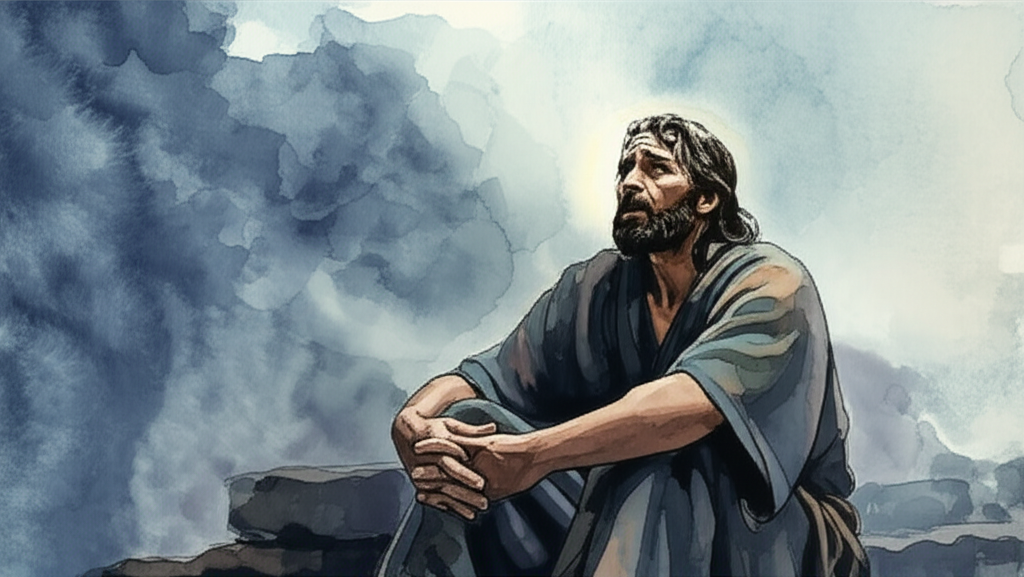
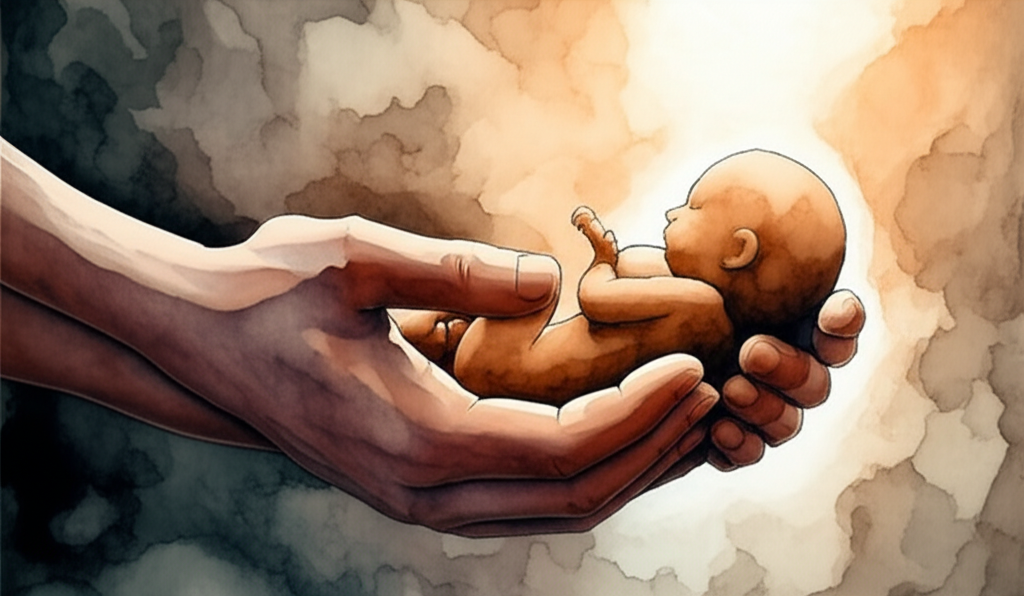
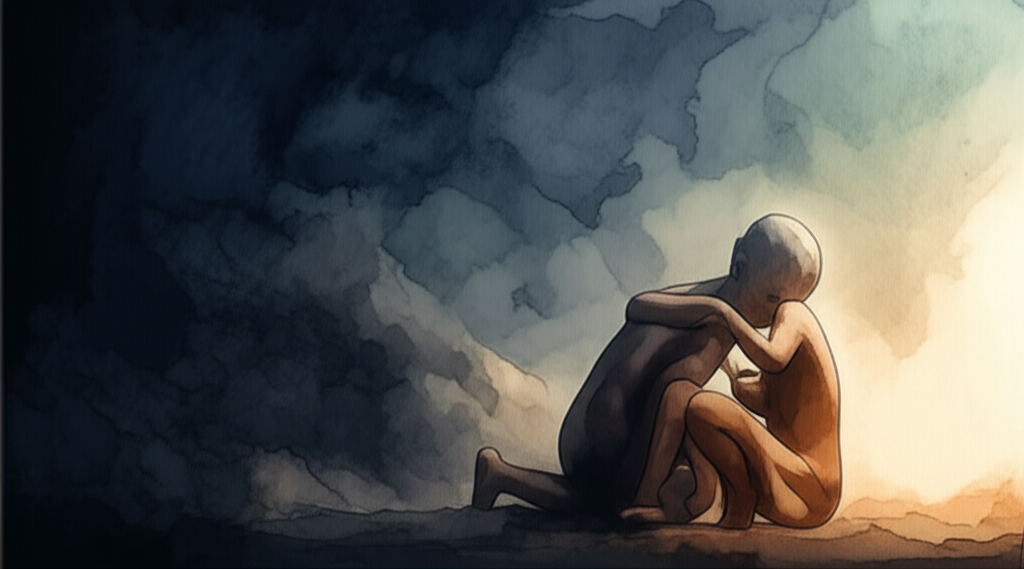
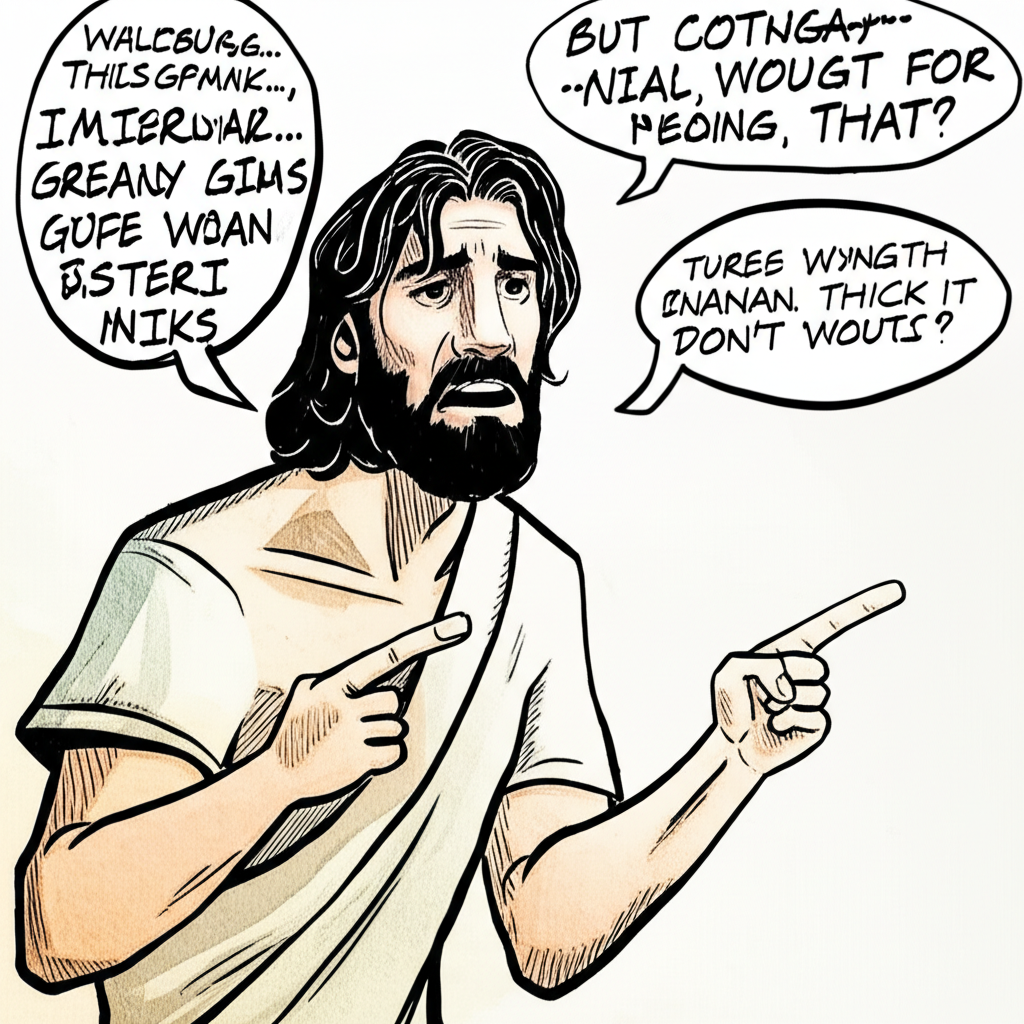
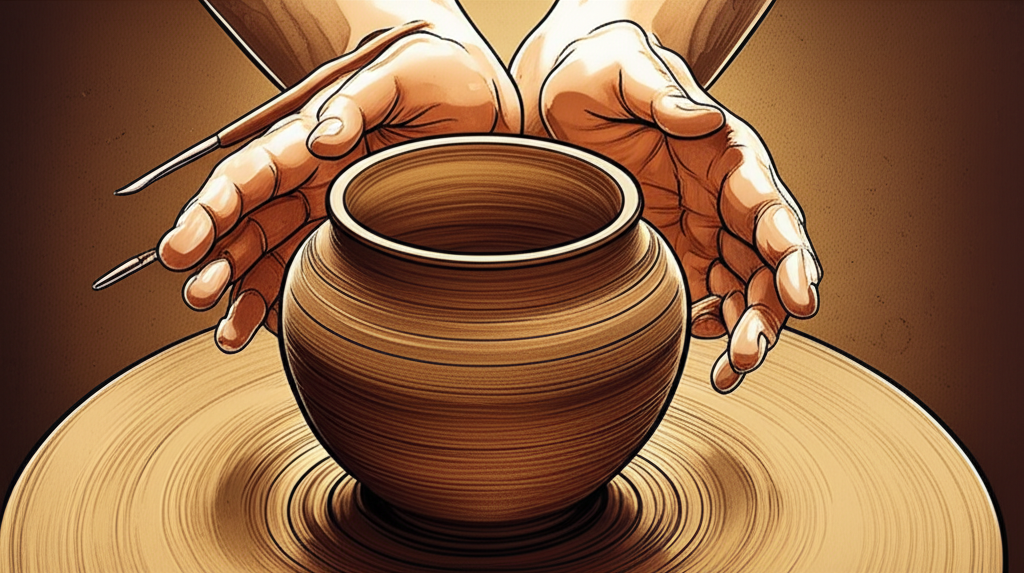
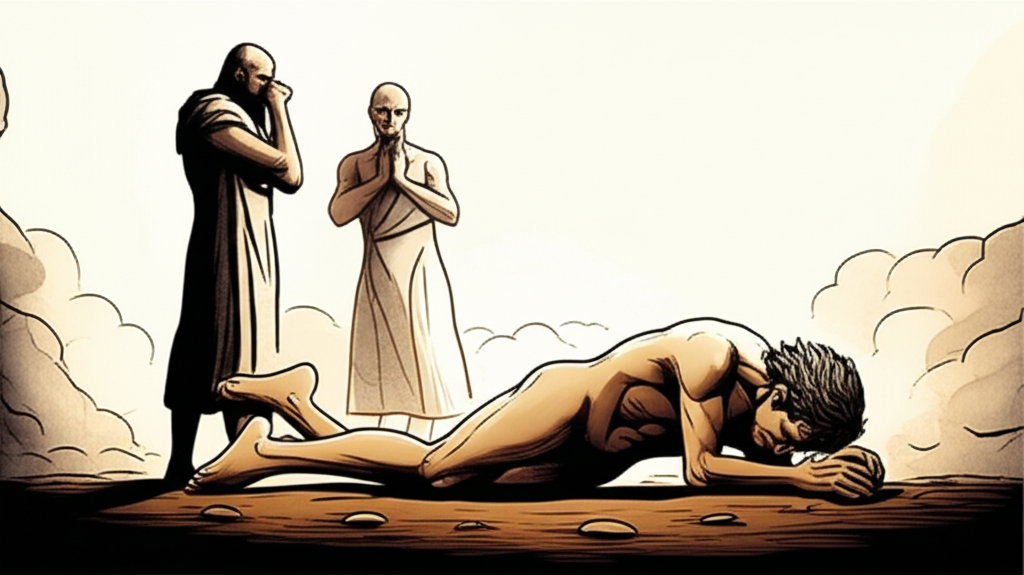


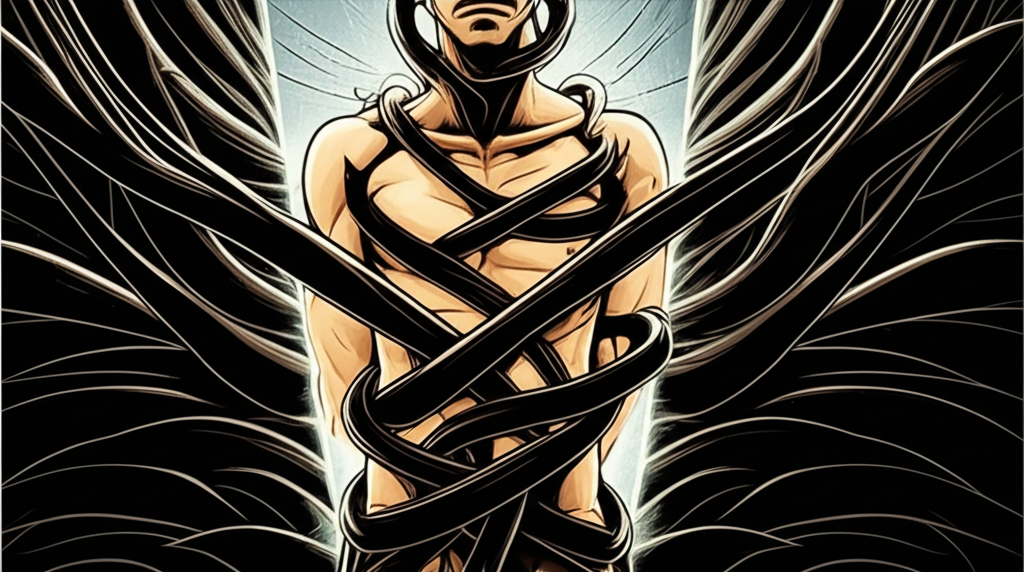
Job chapter 10 kjv
- 1 My soul is weary of my life; I will leave my complaint upon myself; I will speak in the bitterness of my soul.
- 2 I will say unto God, Do not condemn me; shew me wherefore thou contendest with me.
- 3 Is it good unto thee that thou shouldest oppress, that thou shouldest despise the work of thine hands, and shine upon the counsel of the wicked?
- 4 Hast thou eyes of flesh? or seest thou as man seeth?
- 5 Are thy days as the days of man? are thy years as man's days,
- 6 That thou enquirest after mine iniquity, and searchest after my sin?
- 7 Thou knowest that I am not wicked; and there is none that can deliver out of thine hand.
- 8 Thine hands have made me and fashioned me together round about; yet thou dost destroy me.
- 9 Remember, I beseech thee, that thou hast made me as the clay; and wilt thou bring me into dust again?
- 10 Hast thou not poured me out as milk, and curdled me like cheese?
- 11 Thou hast clothed me with skin and flesh, and hast fenced me with bones and sinews.
- 12 Thou hast granted me life and favour, and thy visitation hath preserved my spirit.
- 13 And these things hast thou hid in thine heart: I know that this is with thee.
- 14 If I sin, then thou markest me, and thou wilt not acquit me from mine iniquity.
- 15 If I be wicked, woe unto me; and if I be righteous, yet will I not lift up my head. I am full of confusion; therefore see thou mine affliction;
- 16 For it increaseth. Thou huntest me as a fierce lion: and again thou shewest thyself marvellous upon me.
- 17 Thou renewest thy witnesses against me, and increasest thine indignation upon me; changes and war are against me.
- 18 Wherefore then hast thou brought me forth out of the womb? Oh that I had given up the ghost, and no eye had seen me!
- 19 I should have been as though I had not been; I should have been carried from the womb to the grave.
- 20 Are not my days few? cease then, and let me alone, that I may take comfort a little,
- 21 Before I go whence I shall not return, even to the land of darkness and the shadow of death;
- 22 A land of darkness, as darkness itself; and of the shadow of death, without any order, and where the light is as darkness.
Job chapter 10 nkjv
- 1 "My soul loathes my life; I will give free course to my complaint, I will speak in the bitterness of my soul.
- 2 I will say to God, 'Do not condemn me; Show me why You contend with me.
- 3 Does it seem good to You that You should oppress, That You should despise the work of Your hands, And smile on the counsel of the wicked?
- 4 Do You have eyes of flesh? Or do You see as man sees?
- 5 Are Your days like the days of a mortal man? Are Your years like the days of a mighty man,
- 6 That You should seek for my iniquity And search out my sin,
- 7 Although You know that I am not wicked, And there is no one who can deliver from Your hand?
- 8 'Your hands have made me and fashioned me, An intricate unity; Yet You would destroy me.
- 9 Remember, I pray, that You have made me like clay. And will You turn me into dust again?
- 10 Did You not pour me out like milk, And curdle me like cheese,
- 11 Clothe me with skin and flesh, And knit me together with bones and sinews?
- 12 You have granted me life and favor, And Your care has preserved my spirit.
- 13 'And these things You have hidden in Your heart; I know that this was with You:
- 14 If I sin, then You mark me, And will not acquit me of my iniquity.
- 15 If I am wicked, woe to me; Even if I am righteous, I cannot lift up my head. I am full of disgrace; See my misery!
- 16 If my head is exalted, You hunt me like a fierce lion, And again You show Yourself awesome against me.
- 17 You renew Your witnesses against me, And increase Your indignation toward me; Changes and war are ever with me.
- 18 'Why then have You brought me out of the womb? Oh, that I had perished and no eye had seen me!
- 19 I would have been as though I had not been. I would have been carried from the womb to the grave.
- 20 Are not my days few? Cease! Leave me alone, that I may take a little comfort,
- 21 Before I go to the place from which I shall not return, To the land of darkness and the shadow of death,
- 22 A land as dark as darkness itself, As the shadow of death, without any order, Where even the light is like darkness.' "
Job chapter 10 niv
- 1 "I loathe my very life; therefore I will give free rein to my complaint and speak out in the bitterness of my soul.
- 2 I say to God: Do not declare me guilty, but tell me what charges you have against me.
- 3 Does it please you to oppress me, to spurn the work of your hands, while you smile on the plans of the wicked?
- 4 Do you have eyes of flesh? Do you see as a mortal sees?
- 5 Are your days like those of a mortal or your years like those of a strong man,
- 6 that you must search out my faults and probe after my sin?
- 7 though you know that I am not guilty and that no one can rescue me from your hand?
- 8 "Your hands shaped me and made me. Will you now turn and destroy me?
- 9 Remember that you molded me like clay. Will you now turn me to dust again?
- 10 Did you not pour me out like milk and curdle me like cheese,
- 11 clothe me with skin and flesh and knit me together with bones and sinews?
- 12 You gave me life and showed me kindness, and in your providence watched over my spirit.
- 13 "But this is what you concealed in your heart, and I know that this was in your mind:
- 14 If I sinned, you would be watching me and would not let my offense go unpunished.
- 15 If I am guilty?woe to me! Even if I am innocent, I cannot lift my head, for I am full of shame and drowned in my affliction.
- 16 If I hold my head high, you stalk me like a lion and again display your awesome power against me.
- 17 You bring new witnesses against me and increase your anger toward me; your forces come against me wave upon wave.
- 18 "Why then did you bring me out of the womb? I wish I had died before any eye saw me.
- 19 If only I had never come into being, or had been carried straight from the womb to the grave!
- 20 Are not my few days almost over? Turn away from me so I can have a moment's joy
- 21 before I go to the place of no return, to the land of gloom and utter darkness,
- 22 to the land of deepest night, of utter darkness and disorder, where even the light is like darkness."
Job chapter 10 esv
- 1 "I loathe my life; I will give free utterance to my complaint; I will speak in the bitterness of my soul.
- 2 I will say to God, Do not condemn me; let me know why you contend against me.
- 3 Does it seem good to you to oppress, to despise the work of your hands and favor the designs of the wicked?
- 4 Have you eyes of flesh? Do you see as man sees?
- 5 Are your days as the days of man, or your years as a man's years,
- 6 that you seek out my iniquity and search for my sin,
- 7 although you know that I am not guilty, and there is none to deliver out of your hand?
- 8 Your hands fashioned and made me, and now you have destroyed me altogether.
- 9 Remember that you have made me like clay; and will you return me to the dust?
- 10 Did you not pour me out like milk and curdle me like cheese?
- 11 You clothed me with skin and flesh, and knit me together with bones and sinews.
- 12 You have granted me life and steadfast love, and your care has preserved my spirit.
- 13 Yet these things you hid in your heart; I know that this was your purpose.
- 14 If I sin, you watch me and do not acquit me of my iniquity.
- 15 If I am guilty, woe to me! If I am in the right, I cannot lift up my head, for I am filled with disgrace and look on my affliction.
- 16 And were my head lifted up, you would hunt me like a lion and again work wonders against me.
- 17 You renew your witnesses against me and increase your vexation toward me; you bring fresh troops against me.
- 18 "Why did you bring me out from the womb? Would that I had died before any eye had seen me
- 19 and were as though I had not been, carried from the womb to the grave.
- 20 Are not my days few? Then cease, and leave me alone, that I may find a little cheer
- 21 before I go ? and I shall not return ? to the land of darkness and deep shadow,
- 22 the land of gloom like thick darkness, like deep shadow without any order, where light is as thick darkness."
Job chapter 10 nlt
- 1 "I am disgusted with my life.
Let me complain freely.
My bitter soul must complain. - 2 I will say to God, 'Don't simply condemn me ?
tell me the charge you are bringing against me. - 3 What do you gain by oppressing me?
Why do you reject me, the work of your own hands,
while smiling on the schemes of the wicked? - 4 Are your eyes like those of a human?
Do you see things only as people see them? - 5 Is your lifetime only as long as ours?
Is your life so short - 6 that you must quickly probe for my guilt
and search for my sin? - 7 Although you know I am not guilty,
no one can rescue me from your hands. - 8 "'You formed me with your hands; you made me,
yet now you completely destroy me. - 9 Remember that you made me from dust ?
will you turn me back to dust so soon? - 10 You guided my conception
and formed me in the womb. - 11 You clothed me with skin and flesh,
and you knit my bones and sinews together. - 12 You gave me life and showed me your unfailing love.
My life was preserved by your care. - 13 "'Yet your real motive ?
your true intent ? - 14 was to watch me, and if I sinned,
you would not forgive my guilt. - 15 If I am guilty, too bad for me;
and even if I'm innocent, I can't hold my head high,
because I am filled with shame and misery. - 16 And if I hold my head high, you hunt me like a lion
and display your awesome power against me. - 17 Again and again you witness against me.
You pour out your growing anger on me
and bring fresh armies against me. - 18 "'Why, then, did you deliver me from my mother's womb?
Why didn't you let me die at birth? - 19 It would be as though I had never existed,
going directly from the womb to the grave. - 20 I have only a few days left, so leave me alone,
that I may have a moment of comfort - 21 before I leave ? never to return ?
for the land of darkness and utter gloom. - 22 It is a land as dark as midnight,
a land of gloom and confusion,
where even the light is dark as midnight.'"
- Bible Book of Job
- 1 Story of Job
- 2 Satan Attacks Job's Health
- 3 Job Laments His Birth
- 4 Eliphaz Speaks: The Innocent Prosper
- 5 Call now; is there anyone who will answer you? To which of the holy ones will
- 6 Job Replies: My Complaint Is Just
- 7 Job Continues: My Life Has No Hope
- 8 Bildad Speaks: Job Should Repent
- 9 Job Replies: There Is No Arbiter
- 10 Job Continues: A Plea to God
- 11 Zophar Speaks: You Deserve Worse
- 12 Job Replies: The Lord Has Done This
- 13 Job Continues: Still I Will Hope in God
- 14 Job Continues: Death Comes Soon to All
- 15 Eliphaz Accuses: Job Does Not Fear God
- 16 Job Replies: Miserable Comforters Are You
- 17 Job Continues: Where Then Is My Hope?
- 18 Bildad Speaks: God Punishes the Wicked
- 19 Job Replies: My Redeemer Lives
- 20 Zophar Speaks: The Wicked Will Suffer
- 21 Job Replies: The Wicked Do Prosper
- 22 Eliphaz Speaks: Job's Wickedness Is Great
- 23 Job Replies: Where Is God?
- 24 Why are not times of judgment kept by the Almighty, and why do those who know
- 25 Bildad Speaks: Man Cannot Be Righteous
- 26 Job Replies: God's Majesty Is Unsearchable
- 27 Job Continues: I Will Maintain My Integrity
- 28 Job Continues: Where Is Wisdom?
- 29 Job's Summary Defense
- 30 But now they laugh at me, men who are younger than I, whose fathers I would
- 31 Covenant with my Eyes
- 32 Elihu Rebukes Job's Three Friends
- 33 Elihu Rebukes Job
- 34 Elihu Asserts God's Justice
- 35 Elihu Condemns Job
- 36 Elihu Extols God's Greatness
- 37 Elihu Proclaims God's Majesty
- 38 Job questions God
- 39 Do you know when the mountain goats give birth? Do you observe the calving of
- 40 Job Promises Silence
- 41 Lord's challenge of Leviathan
- 42 Job's Repentance and Restoration